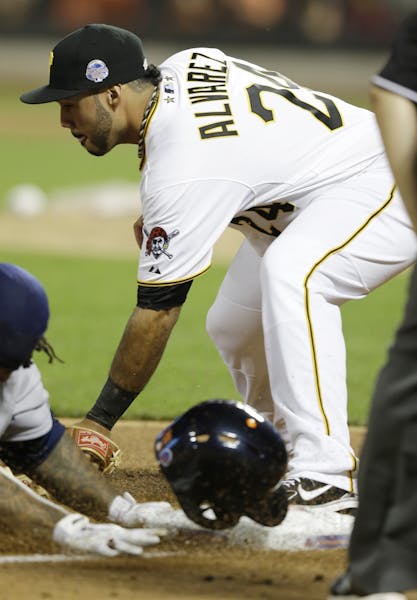That lunar eclipse last week seems totally appropriate, considering the eclipse-like rarity that Joe Mauer should experience Tuesday: For one of the few times since 2010, he will face a pitcher with a higher salary than his.
That it should happen against the Dodgers, who pay righthander Zack Greinke $24 million this year (plus a $2 million installment on his signing bonus), is not exactly a surprise. Los Angeles, fueled by baseball's richest TV contract, owns the largest payroll in American sports history: $234 million, according to figures obtained by the Associated Press, a staggering $30 million more than the free-spending Yankees.
That's also more than 2½ times as much as the Twins' $84 million payroll, and the comparisons are remarkable. The Twins might be paying Mauer $23 million per season — not since he faced Philadelphia's Cliff Lee last May has Mauer batted against a higher-salaried pitcher — but among his teammates, only Ricky Nolasco (at $12 million) also makes an eight-figure salary. The Dodgers? They have 10 players earning $10 million or more, including four — Greinke, Carl Crawford, Adrian Gonzalez and Matt Kemp — who top $20 million apiece.
And none of this counts injured ace Clayton Kershaw, whose $4 million salary this year came with an $18 million signing bonus, and escalates to $30 million or more for each of the next six seasons.
"It's a byproduct of our approach to put the best team on the field," Dodgers CEO Stan Kasten told USA Today last month. "There has been criticism inside baseball [for L.A.'s record-setting payroll], but that's OK.
"We're supposed to be contenders every year. We're the Dodgers."
Yes they are, and far from resenting the payroll gap, the Twins benefit from it. See, Los Angeles can afford to hand out all that cash — truthfully, the Dodgers probably could absorb salaries twice that high — because of their new SportsNet LA network, a Dodgers-centric channel that came with an $8.35 billion guarantee over 25 years from Time Warner Cable. That's $334 million in TV revenue per year — the Twins collect, oh, roughly $300 million less this year from Fox Sports North — before they sell a single ticket.
The Dodgers also will pay somewhere in the neighborhood of $14 million under baseball's "competitive balance tax," a device intended to penalize teams for excessive payrolls. But it's barely a blip on L.A.'s balance sheet.
How does this help the Twins? Under a deal reached with MLB in January, the Dodgers have agreed to pay close to $2 billion over the life of their new contract into MLB's revenue-sharing system, beginning with a $44 million payment this year and escalating from there. The new network is having difficulty convincing cable operators to carry the new channel at a price of $4 per subscriber — even legendary broadcaster Vin Scully can't get Dodgers games on TV at his home — but is confident that agreements eventually will be reached. Whether they are or not, the Twins' share of Dodgers TV money amounts to about $1.5 million in 2014, and perhaps as much as $70 million over the years.
In other words, money from the Dodgers could pay the salary of Chris Colabello, Josmil Pinto and Kyle Gibson this year. Nice of them, huh?
The Wrigley-Twins connection
Wrigley Field turned 100 last week, a centennial celebration that had little to do with the Twins. The Cubs have played the Twins only 12 times in their ivy-vined ballpark, all since interleague play began in 1997.
But amid the meager statistics those games generated — Torii Hunter and Jason Kubel's two homers apiece are the Twins' best, while Cristian Guzman leads them with 10 hits — is this especially appropriate one: No Twins player ever drove in more runs in Wrigley than the six belonging to Ron Coomer, now in his first year as the Cubs' radio analyst on WGN.
Nolasco's alarming April
Ricky Nolasco earned his second victory Thursday, but his first month with his new team hasn't been what the Twins had hoped. Nolasco gave up six runs in six-plus innings at Tampa Bay, while striking out only one batter. Nolasco has given up five or more runs in four starts already.
No Twins starter gave up five runs more than seven times last year. Meanwhile, San Francisco lefthander Madison Bumgarner hasn't given up five runs since June 1, 2013 — 24 starts ago.
Always a first time?
The Twins have drawn 121 walks, most in the major leagues. History says they won't stay there, though — in the American League's 113-year history, the Twins (and the Washington Senators before them) never have led the AL in walks.
CENTRAL INTELLIGENCE
Even the best-laid plans go awry, as the American League Central has discovered already this year. Each team's biggest disappointment thus far:
Indians: No telling whether the switch from catcher/first base to third is to blame, but Carlos Santana's awful start (.128 average, three RBI) leaves a huge hole in Cleveland's lineup.
• • •
Royals
They can live with the batting average hovering around .200, but Kansas City dropped Billy Butler to sixth in the lineup because he hadn't hit a home run yet.
• • •
Tigers: Alex Gonzalez drilled a walk-off single on Opening Day, but barely two weeks later, the veteran shortstop was released due to his terrible range and 5-for-30 hitting.
• • •
White Sox: When Avasail Garcia was lost for the year, Alejandro De Aza was supposed to ease the loss. A .187 average and .244 on-base percentage entering Saturday hasn't done it.

How NIL distracted the Gophers men's basketball team last year and what lessons were learned
Twins expected to be active on the trade market during offseason

Vikings to sign kicker after Will Reichard injured
Reusse: Hoosiers football at last enjoys its moment in the spotlight

